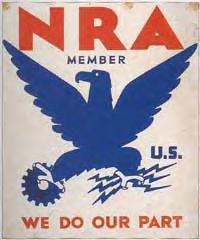
Systemic Corruption and Collectivism
Recently, I've been writing about the National Industrial Recovery Act (NIRA) of
1933 because there are parallels in FDR's program with some elements of the
technocratic tyranny under which we are now living. The NIRA was struck
down by the Supreme Court as being unconstitutional and it is my belief that the
key elements of our modern day technocratic tyranny could also be struck down by
the Supreme Court using the Schecter decision as precedent if the evidence can
be put together in such a way that an argument can be made.
The essence of the Schecter v. United States as I read it, was that FDR authorized trade associations and trade unions as collective representatives of industry interest groups, license to write the rules under which the industry would operate in a system of "self-governance".
Here is a brief description on Conservapedia:
The National Recovery Administration (NRA) was a key part of the First New Deal in 1933-35, until it was abolished by the Supreme Court. The goal was to eliminate cut-throat competition by bringing industry, labor and government together to create codes of fair practices and set prices. The NRA was created by the National Industrial Recovery Act) under the general guidance of President Franklin D. Roosevelt and his top advisors. It allowed industries to create "codes of fair competition," which were intended to reduce destructive competition and to help workers by setting minimum wages and maximum weekly hours. Most economic historians consider the NRA to be a resounding failure with very little positive economic success.
Essentially, what FDR did was to legalize and legitimize racketeering. The trade associations and trade unions were racketeers who controlled their market segment. In the case of Schecter, the market segment was poultry distribution in New York City. But who doesn't know that the mob always - and probably still does control the olive oil business? In fact, there are still sections of Manhattan where single products dominate the block - diamond district, lamp district, fish market, beef/butchers section.
This systemic corruption was introduced under a patriotic banner of economic recovery.
|
|
|
It should be noted that in most references
to the NRA today, the labor protections are lamented while the
employer/supplier corruption is ignored.
Hugh S. Johnson from Oklahoma was the head of the National Recovery Administration. As a part of the history of Oklahoma, there is a paragraph about the NRA on the Oklahoma Historical Society's website. |
|
||
|
"In June 1933 Pres. Franklin D. Roosevelt
signed the National Industrial Recovery Act (NIRA), opening the way for
cooperation between the federal government and businesses in order to
stimulate the economy during the Great Depression. Antitrust laws were
suspended, and companies in every industry were to agree to a code of
competition that governed prices, wages, and business practices. The
NIRA created the National Recovery Administration (NRA), headed by
Oklahoman Hugh S. Johnson. The NRA administered the code-writing process
and the enforcing of 541 approved codes. Through intense publicity
campaigns consumers were encouraged to do business with companies that
displayed the Blue Eagle as a sign of their cooperation with the NRA. ...The NRA did make headway in the petroleum industry by establishing prorationing of oil through its petroleum code, drawn up by September 1933. The code controlled the amount of oil a company could produce and permitted monopolistic practices such as allowing businesses to share manufacturing, transportation, and marketing facilities. Larger corporations dominated the code-making deliberations." |
|||
As the history of the NRA shows, systemic corruption and collectivism cannot exist without official sanction under the color of law. The rampant corruption of banking and the stock market in the 1920's was followed by the reforms of the 1930's. The reforms that brought the banks and stock market back under control were good. Control of the utility monopolies was good. Officially sanctioned monopolies of private industry with price controls was not good and fortunately, the Supreme Court put a stop to them - at least temporarily.
 |
|
Vicky Davis
February 25, 2013